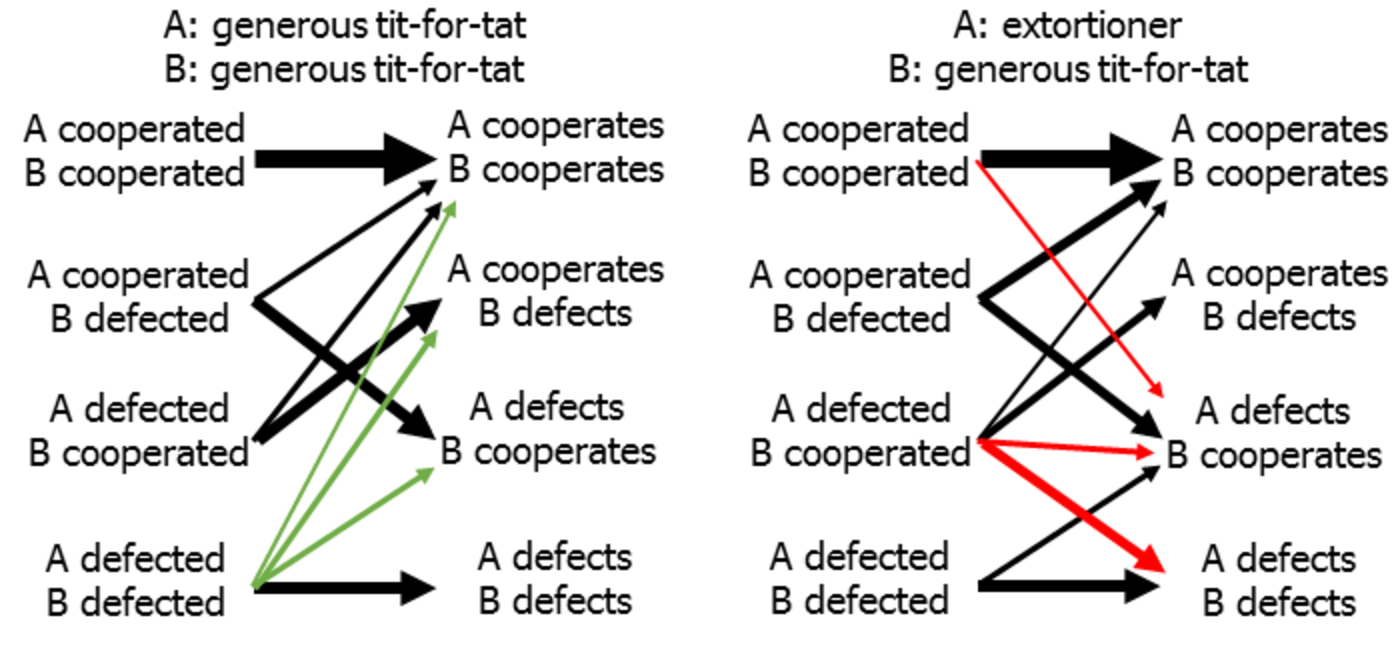A clever game player can choose a strategy than ensures it beats an opponent in the Prisoner’s dilemma game
Background
Cooperatively behaviour is a puzzle for evolutionary biology because we might expect animals to look after themselves. Researchers have understand how cooperation can evolve by using game theory, especially the Prisoner’s dilemma game. In this game players can do well by cooperating a lot, but there is always the temptation to defect on the deal for a better payoff. For a long time it seemed that the best way to play used tit-for-tat: punishing defection but then forgiving the partner.
Findings
There are ways to play the game that enable a player to always win. A game with many opportunities to cooperate or defect can be played with a strategy of four probabilities, one for each of the last interactions: both cooperated, focal player cooperated and partner defected; focal player cooperated and partner defected; both defected. A player that appreciates that their partner will respond to their behaviour can extort them to ensure they win by choosing probabilities from certain ranges. The more the partner cooperates, the more both their scores increase, but the extortioner always wins.
Implications
Until now, it was believed that defecting against a sensible strategy like tit-for-tat will reduce everyone’s fitness. In a population of lots of competing strategies, tit-for-tat usually wins, especially ‘generous tit-for-tat’ (see left figure) does well because it punishes defection but avoids long stretches of mutual defection (by being forgiving: green arrows). Extorting strategies, by slightly increasing the chance of defection (red arrows on right), beat even generous tit-for-tat in one-on-on interactions.
Subject
Social behaviour
Subject Group
Zoology and Ecology
Keywords
cooperation
game
contest
prisoners dilemma
extortion


Image credit:
Andrew Higginson
Posted by
AndrewDHigginson
on Mon Jul 16 2018
Article ID
F3M9NY4XX
Details of original research article:
Press WH, Dyson FJ. Iterated Prisoner's Dilemma contains strategies that dominate any evolutionary opponent. Proceedings of the National Academy of Sciences. 2012;109:10409-10413. View the Thread Network for this Finding
View the Thread Network for this Finding
Preceded by:
Cooperation evolves readily if individuals can walk away from uncooperative partners
Posted by: AndrewDHigginson Posted Fri Jun 26 2020
Conflicts between animals are usually settled without injury, but such ritualised harmless fighting has evolved because it is good for individuals, not for the “survival of the species”
Posted by: AndrewDHigginson Posted Fri Oct 27 2017
Followed by:
Clever game players that extort their partner in the Prisoner’s dilemma do well head-to-head but do poorly in a mixed population of different players
Posted by: AndrewDHigginson Posted Mon Jul 16 2018
